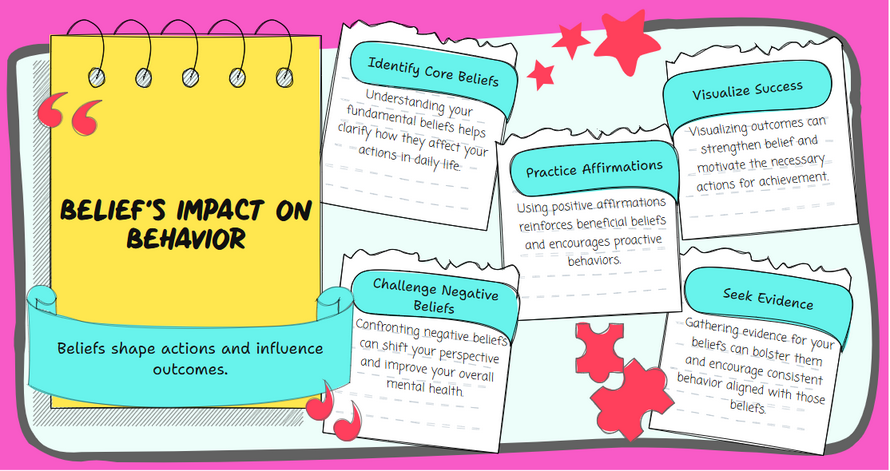
Delve into the profound impact of the strength of your belief on your life and achievements. The strength of belief is the intensity and conviction with which a person holds a particular idea or opinion. It is often characterized by unwavering confidence and a steadfast refusal to entertain opposing viewpoints.
A notable disparity exists between individuals who struggle with minor tasks and those who accomplish complex objectives. This difference is often attributed not to inherent abilities, but to the decisions individuals make.
Table of Contents
How the strength of your belief translates from thought to behavior

The strength of an individual’s belief plays a critical role in translating cognition into behaviour. When a belief is perceived as unwavering, it provides a stable sense of certainty and drives motivation, often resulting in exceptional persistence. Such beliefs shape situational interpretations, decision-making processes, and the degree of commitment exhibited during the pursuit of goals. Conversely, beliefs that are less firmly held frequently result in indecision, inconsistency, or inaction. Strong, non-analytical beliefs are more likely to bridge the gap between intention and action, facilitating sustained, goal-directed behavior.
The Anatomy of Belief: What Makes It Strong?
Belief is not a passive state; rather, it is an active force shaped by experiences, emotions, and evidence. Fundamentally, belief refers to the acceptance that a proposition is true or exists, often in the absence of complete proof.
Moreover, the strength of a belief is demonstrated by its ability to endure challenges, incorporate new information, and motivate behavior. To illustrate this, psychologist Albert Bandura, through the concept of self-efficacy, posits that belief in one’s capabilities forms the foundation of achievement. This perspective suggests that individuals who possess strong self-efficacy are more likely to initiate and persist in goal-directed activities.
The Science Behind Belief: From Brain to Behaviour
Belief is more than an idea; it is grounded in measurable biological and psychological processes. Cognitive dissonance theory, developed by Leon Festinger, explains why we cling to our beliefs: changing them is uncomfortable, so we rationalize to maintain harmony. Cognitive dissonance refers to the mental discomfort that arises when someone holds two or more conflicting ideas, values, or beliefs. Strong beliefs help reduce this discomfort, creating a feedback loop of reinforcement
Understanding the Power of Belief
“Belief is a conviction; it’s not just an opinion. It is the intellectual willingness to stand behind an idea or concept irrespective of empirical support. Beliefs profoundly affect us in numerous ways, from our interpersonal relationships to the careers we choose.
- Personal growth
- Decision-making
- Motivation and perseverance
- Emotional well-being
- Social interactions.
It is essential to maintain awareness of personal beliefs, as these significantly influence outcomes. An individual’s belief system is unique, shaped by personal motivation and cognitive processes. Success is often proportional to the strength of one’s convictions.
Individuals frequently lack clarity regarding their objectives, often recognizing dissatisfaction without identifying specific goals. It is advisable to examine intentions and define desired outcomes systematically. Documenting and regularly reviewing these goals can reinforce focus and motivation.
Be inquisitive

Inquisitiveness Bridges Belief Conflicts
In polarized times, questioning others’ perspectives fosters empathy. A 2025 Pew Research study found that individuals who ask open-ended questions during debates are 50% more likely to find common ground, strengthening their own beliefs through dialogue.
A comprehensive investigation into methods for achieving objectives is essential. Utilize diverse resources, including literature, educational materials, and consultation with individuals who have attained similar goals. Engaging with experienced individuals can provide valuable insights into effective strategies for success.
Expanding professional networks beyond existing contacts is recommended. Initiating communication to seek advice may result in valuable mentorship or support. Even minimal responses can yield significant opportunities, making this approach both efficient and rewarding.
Be unique

Embracing your unique qualities allows you to recognise your strengths and build confidence in your abilities. Valuing your individuality encourages self-assurance and personal growth. This self-acceptance transforms doubt into determination, helping you trust the value of your unique path. Ultimately, your belief in your strength grows because you understand that your uniqueness is your greatest asset.
Adapting and building upon acquired concepts can foster the development of a unique creative process. Pursuing innovative approaches and taking calculated risks may differentiate individuals in achieving their goals. Systematically evaluating potential challenges and benefits can help maintain focus on desired outcomes.
Be better than your competition
When you were a kid and watched your older siblings or friends learning to ride a bike (without training wheels), did you look at their scraped knees, elbows, and hands and say, “Whoa — just wait until the neighborhood kids hear about this.” No, you begged to give it a shot. With much practice and sometimes pain, you slowly learned to keep your balance. Soon, you were racing or doing tricks to “outdo” friends.
Persistence following setbacks is critical for skill acquisition. Early attempts may be unsuccessful, but repeated effort typically leads to eventual mastery. Strong belief in one’s potential can drive individuals to excel within increasingly broader contexts.
Adapting and building upon acquired concepts can foster the development of a unique creative process. Pursuing innovative approaches and taking calculated risks may differentiate individuals in achieving their goals. Systematically evaluating potential challenges and benefits can help maintain focus on desired outcomes.
Be positive

Having a positive outlook can boost self-confidence by helping people focus on what they can achieve instead of what might go wrong. When we look for good outcomes, we build confidence and become more resilient. Seeing challenges as chances to learn and grow also helps us believe in our ability to handle difficulties.
Focusing on obstacles can reinforce their perceived significance. Doubt regarding the feasibility of an endeavor often undermines success. Maintaining confidence in personal potential is essential for overcoming negative external influences.
Conclusion
Believe whatever you like, but that is what you get. Your system of belief is an entity unto itself.\” It is fueled by desire and governed by thoughts and actions. Simply put, you are successful because of the power of your belief.
The strength of personal conviction is closely linked to self-improvement and success. Recognizing belief as a motivating force and consistently cultivating it can facilitate significant achievements. Regular self-assessment of belief strength may guide individuals toward continued progress.
